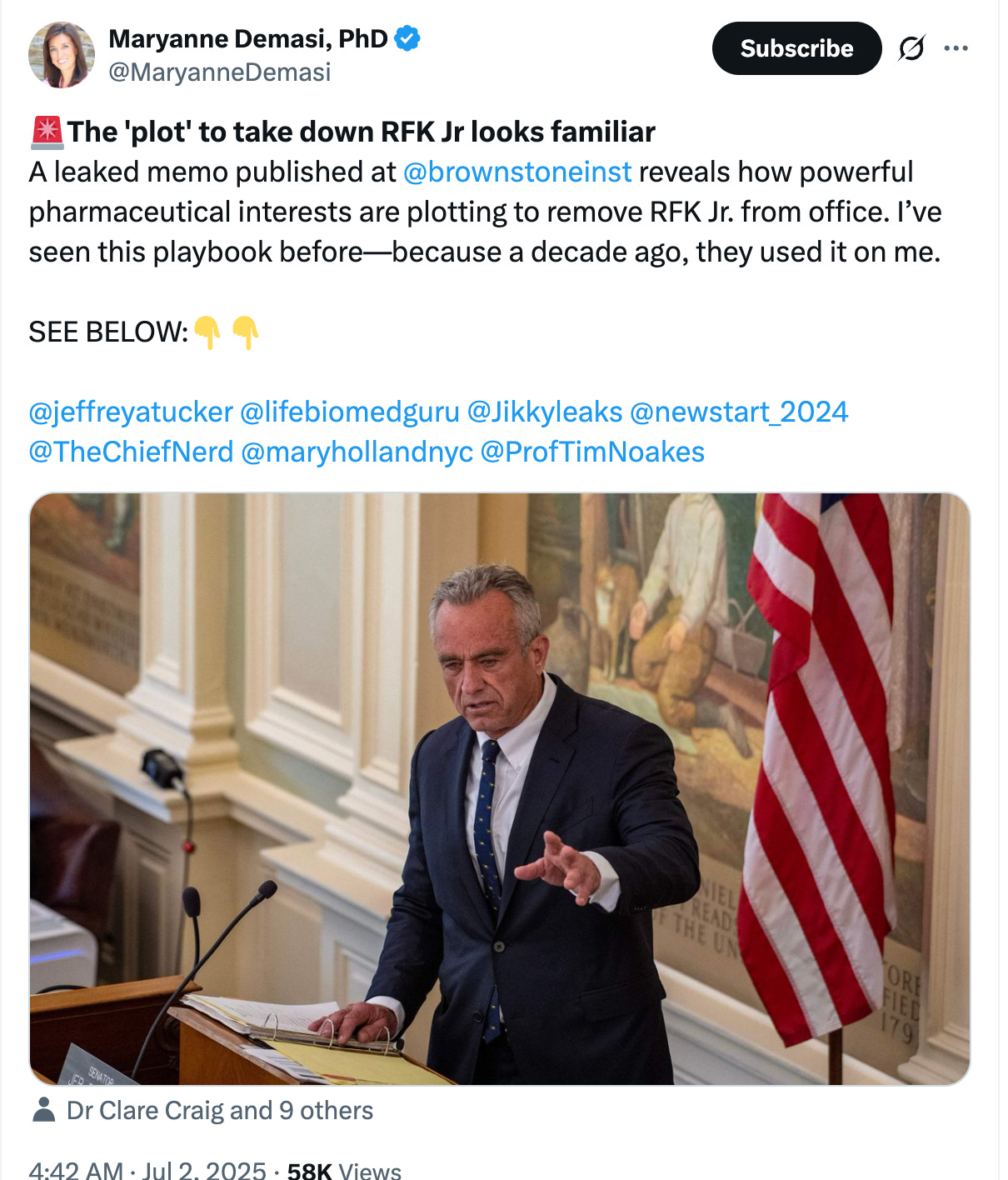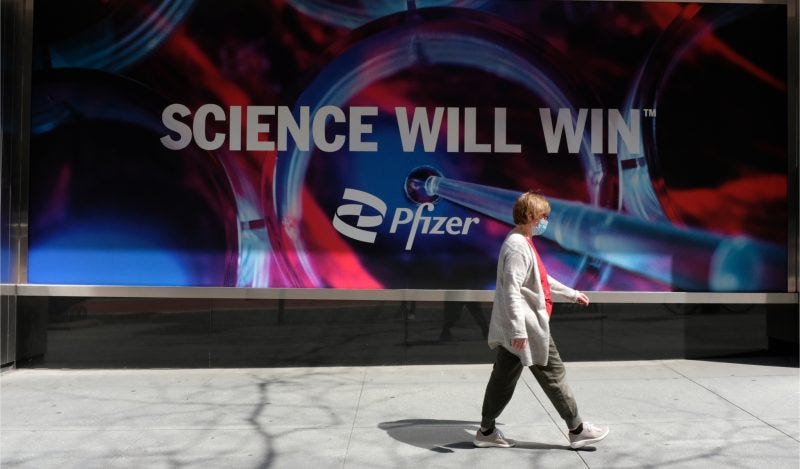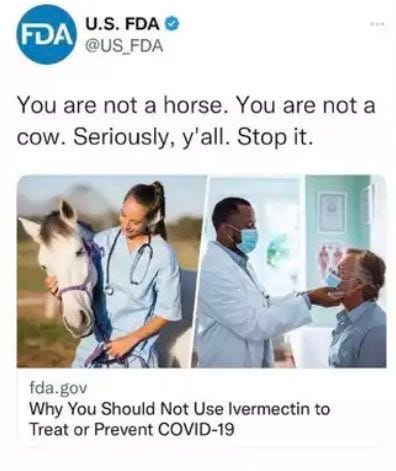The Curious Incident of The Herb that threatened Pfizer's bottom line
How Big Pharma's PR machine neutralizes cheap competition to keep the profits flowing
Earlier this week, posts like this kept showing up in my X feed, an uncomfortable reminder of just how far the dark tentacles of Big Pharma reach:
Of course Big Pharma has a long and sordid history of rigging the game and going after doctors (and others) who won’t stick to the prescribed (so to speak) script. But the extent to which their tentacles reach is something most people still don’t seem to grasp: The entire health care system, government, regulatory bodies, the mainstream media, even the dominant cultural narrative around how we view our bodies and minds (and what it means to be human in the first place) — all of this has been distorted, corrupted, contaminated, sullied.
Picture an army of white coated zombies lurching down your town’s Main Street mumbling “safe and effective” and “the science is settled” and attempting to gobble up the brains of anyone who gives off the slightest whiff of independent thinking.
One of my earliest “red pill” moments occurred back in the dark ages when I was a resident in psychiatry. I had undertaken a little research project on purported herbal remedies for anxiety and depression. I didn’t expect to find much solid science behind these folk remedies and, in most cases, my expectations were borne out.
But there was one innocuous little herb—a plant you might just find growing as a weed in your garden if you know what to look for—that seemed to have some credible science behind it: Hypericum perforatum, aka St. John’s Wort (the original “SJW”), had been studied extensively as a treatment for mild to moderate major depression.
There were several randomized controlled trials showing evidence of efficacy, and side effects were said to be milder than those of conventional antidepressants. At the time (2001) SJW was already widely used as an antidepressant in Europe—and it was starting to catch on in North America.

Coincidentally, around the same time I was undertaking my little literature review, I read (in my local newspaper, no less) that a new study had come out in the Journal of the American Medical Association (JAMA) showing that SJW was not effective in treating depression. There were two things that puzzled me about this:
It seemed to contradict a large body of previous research (including a recent systematic review in the Archives of Internal Medicine) and
In the days that followed, the findings made worldwide headline news, gracing the pages of every major (and some not so major) newspapers. It was discussed on CNN and other TV networks. Jay Leno even mentioned the study in his “Tonight Show” monologue. "If those people were depressed before," he chortled, "Wait until they hear about this!"
Why, I wondered, was this small negative study about an obscure herbal product being treated as if the authors had discovered a cure for cancer?
So I did a little digging and, quelle surprise, it turns out the study was paid for by Pfizer, whose blockbuster antidepressant medication ZOLOFT was just then in the process of making its shareholders very rich. Furthermore, not only was the study statistically underpowered and too short to prove much of anything but, if you actually took the time to read it instead of just browsing the headlines, it did, in fact, show a remission (i.e. cure) rate that was three times higher with the herb than with placebo. This advantage was statistically significant—though curiously low in both groups at 15 % vs 5%, perhaps due to the short timeline. There were also non-statistically significant advantages in other outcome measures, such as improvements on depression rating scales. In their discussion section, the authors noted that “St John's wort was safe and well tolerated.”
Strangely, though, what the authors chose to prioritize and publicize—and the only thing most people, including most doctors, ever heard about—were the measures on which SJW did not achieve a statistically significant advantage over placebo. The headlines—all eerily similar—went something like: St. John’s Wort Ineffective for Treating Depression. You’d almost think a massive and lavishly funded PR machine were at work behind the scenes. Jay Leno? Seriously?
I’d always known that drug companies had a tendency to, shall we say, “selectively curate” the evidence for their own drugs’ efficacy and safety. I knew they had developed an uncomfortably cozy relationship with certain doctors, and with university medical faculties, and with the government regulatory bodies that were supposed to be keeping them honest. But it had never occurred to me that they had the power to so profoundly influence how the media covered something like this—effectively shaping a narrative out of thin air about something not even directly related to their products. (One wonders how much of the whole concept of depression as a “chemical imbalance in the brain” grew out of similar PR efforts—but that is a topic for another day.)
Fast forward to 2020. I’d almost forgotten about the curious incident of the herb that threatened Pfizer’s bottom line when I started noticing something weird about the way the media (not to mention the aforementioned captured regulatory bodies) were reacting to the quest to find cheap (non-patentable) existing drugs to treat COVID 19. Suddenly the FDA was telling people that ivermectin — a drug that had been taken by over a billion humans and had won it’s inventors the Nobel Prize for Medicine in 2015 (in recognition of the dramatic improvements in human health brought about by it)—was a medicine exclusively for horses and cows.
Hydroxychloroquine, another safe old drug with plausible physiological reasons to believe it might be effective versus COVID, received similar treatment. (To wit: who funded Surgisphere and their phony studies “showing” HCQ didn’t work?) Even vitamin D supplementation was not recommended by most governments, though there was evidence of benefit as early as 2020—and it’s hard to imagine anything safer. I mean, vitamin D? Why not give it a try? What’s the worst thing that could happen—you wasted six bucks and got COVID anyway? But in April of 2021 (I wish I were making this up) Liberal Health Minister Patti Hadju stood up in the House of Commons and said vitamin D for COVID was fake news. (Systematic reviews and randomized controlled trials would later prove her wrong. One wonders how many Canadians died as a result of Hadju’s misinformation.)
But that wasn’t the worst of it. Licensing authorities started going after doctors who prescribed Ivermectin and HCQ. Many lost jobs or had their medical licenses threatened and some actually lost them. The justification authorities gave was always something along the lines of “Ivermectin has not been approved by Health Canada for that use.” Which would makes sense if not for the fact that somewhere between 20 and 30% of all prescriptions written by doctors in North America are “off-label” — meaning they have not been approved by Health Canada (or the FDA) for the condition they’re being used for. In my specialty (psychiatry) the number is even higher. It’s an accepted practice. Every doctor does it occasionally. Some doctors do it all the time. Some of the off-label prescribing is justified. Some is pure quackery.
To give just one egregious example, Gabapentin, Lyrica, and similar drugs (called “neuromodulators”, but more properly classed as sedatives) were originally developed as anti-epileptic medications. But they have been used for years now—off label—as painkillers. In his injury rehab practice, Chris sees these drugs routinely prescribed for lower back pain, even though there is very good evidence they don’t work, guidelines that say not to use them, and evidence that they cause weight gain, and can be associated with motor vehicle collisions and overdose. Why haven’t they become a target for “debunking” by the Big Pharma PR Machine? Why haven’t medical colleges censured or even stripped the licenses of docs who use them? Our guess is that these drugs are making Big $$ for Big Pharma, so there is no vested interest; no PR funding; no sponsored talks by “Experts™” to shape the narrative around them.
But ivermectin? Safer than Tylenol, cheap as dirt, and potentially an alternative to new and expensive antivirals such as Pfizer’s Paxlovid? Dr. Pierre Kory wrote a whole book about the campaign against it:
“I set out,” he said,
to understand and expose what was happening with repurposed drugs, ivermectin specifically. By October of 2020, we had identified an inexpensive, safe, widely available medication that was showing tremendous potential not just as a treatment for COVID but also as a preventative. As the weeks and months wore on, the data supporting its safety and efficacy were astounding. And yet the backlash against it was swift and furious. Positive studies were overturned and retracted. Negative studies appeared out of thin air. Around the world it was being used to tremendous, almost impossible success, and yet doctors were punished for prescribing it, pharmacies refused to fill valid prescriptions for it, and the media would only touch it to call it “the horse dewormer.” To a physician fighting on the front lines of this battle, this systematic smear campaign was unfathomable.
Unfathomable indeed. Because whether or not you share Dr. Kory’s enthusiasm for ivermectin versus COVID, the only thing that stood to be seriously harmed by it was pharma profits.
We all know that Big Pharma tries its best to sell “safe and effective” drugs. From “mother’s little helper” to thalidomide to Oxycontin—most folks with their eyes open know enough to be skeptical about ads for the new wonder drug. But what is much less obvious is the targeted attacking of cheaper and potentially better treatment options—options that are not patentable blockbuster drugs, and which might eat into Big Pharma’s bottom line. Big Pharma is even more insidious than you thought. We need to be skeptical of negative news as well.








Here in the North the mood-adjusting plants are ready to be harvested as the year starts winding down (Half over! Already?) to help with all those time-based and other anxieties.
St John's Wort is in bud, Chamomile and Valerian (original plant from which Valium was copied) are flowering, with various degrees of calming in each.
Ingested Valerian root is potent, but the perfumed flowers added to a hot bath will cure any sleep issues with no side effects.
Then there was ephedrine, an excellent herb for treating sinus congestion when used properly, that was suddenly discovered to have caused severe injury to 2 or 3 athletes allegedly using it for frivolous purposes, with the predictable result it was banned right around the time Big Pharma started coming out with its various brands of antihistamines.
And don't get me started on sassafras root. Fortunately, they haven't managed to kill all the dandelions yet.